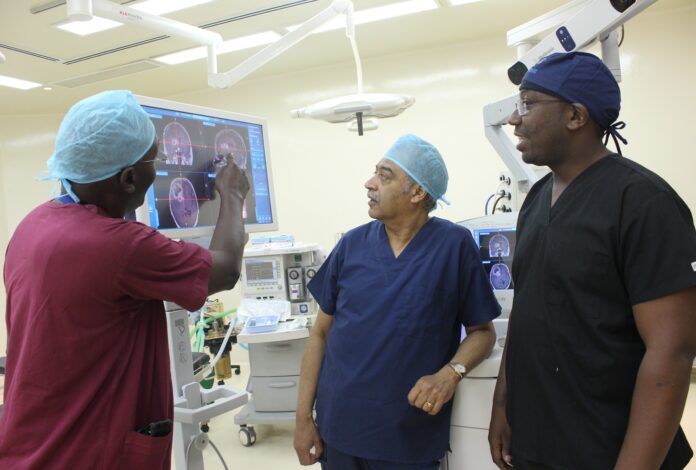Aga Khan University Hospital Nairobi, (AKUH) has become the first in sub-Saharan Africa, to introduce a new advanced brain, head, neck and spine surgery technology. The highly specialised Stealth S7 neuronavigation system helps in planning a surgical approach to the targeted lesion with precision, confidence and safety, avoiding areas of the brain that directly control function during tumor surgery and in accurately operating on the spine during spinal fusion surgery. Acquisition of this system is a first step towards the establishment of a Centre of Excellence in Neurosciences at AKUH, which will provide comprehensive and quality care for all diseases related to the nervous system and spine.
“Neuronavigation technology has revolutionised brain surgery, as it allows the surgeon to accurately access different brain structures with ease,” said Dr Edwin Mogere, a full-time faculty member and neurosurgeon at AKUH. “As a result, it saves time, and more importantly it reduces any morbidity associated with surgery. The technology is standard in neurosurgery, head, neck and spine care worldwide and the Aga Khan University Hospital is now the first in the region to introduce the technology and the third in Africa outside Egypt and South Africa.”
AKUH is currently training its specialists, residents and allied teams on the technology to offer quality multidisciplinary care and through their external rotation programme, residents from others universities and hospitals including; University of Nairobi, School of Medicine, Kenyatta National Hospital and Kenyatta University Hospital are already benefitting from this training.
Navigation systems have been shown in clinical studies to reduce the length of surgery, lowering the incidence of wound infections, and leading to safer, more precise surgeries.
“This technology enables the neurosurgeon to utilise image-guided computer technology, to accurately project images from computed tomography (CT) or magnetic resonance imaging (MRI) data,” said Mr Mahmood Qureshi, part-time faculty member and a private neurosurgeon at Aga Khan University Hospital. “These image-guided and computer-assisted technologies, called “neuro-navigation” systems, provide highly precise spatial information to neurosurgeons as they conduct the surgical procedure.”
The navigation system, works much like a GPS system guided by infra-red beams and can help in the accurate localisation of anatomic structures, such as the carotid artery (artery that supplies head and neck with oxygenated blood) or cranial nerves (nerves that emerge directly from the brain), particularly if they are deep within a tumour, and may not be visible even under the microscope.
Navigation can also help make approaches through the skull bone safer, sparing structures, such as those within of the inner ear or near major blood vessels. In approaches to areas where tumour recurrences may have altered the normal anatomy, navigation can help the neurosurgeon to operate accurately.
Ear, nose, and throat (ENT) surgeons can also use navigation as an aid for nasal, paranasal, and operations involving parts of the hearing mechanism in the inner ear.
“The navigation system has a special role in ENT surgeries particularly in functional endoscopic sinuses surgeries, in which it helps in precise opening of different types of sinus cells, which reduces the recurrence of sinus disease significantly,” said Dr Amit Shanker, Consultant ENT, Head and Neck Surgeon at the hospital. “It also helps in frontal sinus surgeries where the risk of damage to the brain and eye is minimised. With the help of navigation technology, it is now easy for the surgeon to locate a different tier of frontal cells to achieve maximum disease clearance. The navigation system is also useful when doing middle-ear and inner-ear surgeries to avoid damage to important nerves and major vessels.”
This technology is also utilised in the surgical treatment of Parkinson’s disease, a common movement disorder which occurs when a patients nerve cells are not adequately management medically. Furthermore, use of neuronavigation and electrical studies of the brain (neurophysiology) during surgery of lesions increases the chances of successful surgery without unduly endangering the patient. The navigation system is equally valuable during surgery of the spinal cord, helping the surgical team navigate the spine safely.
Even though this technology is currently only available at AKUH, it is expected that other hospitals will soon introduce it due to its associated benefits.
The acquisition of this highly specialised system by Aga Khan University Hospital, the only Joint Commission International accredited hospital in Kenya, reaffirms its premier status as the leading provider of quality teaching, clinical care and research.









